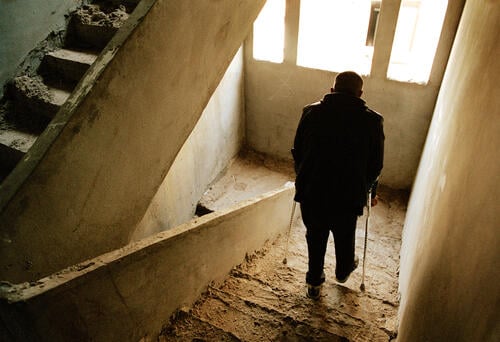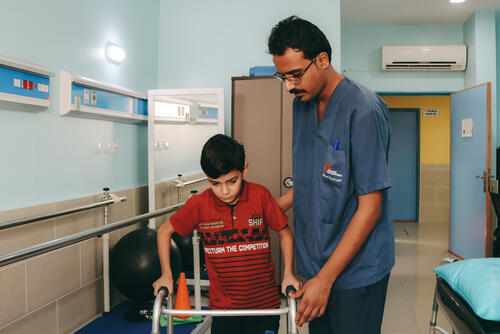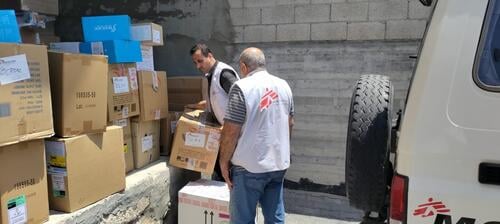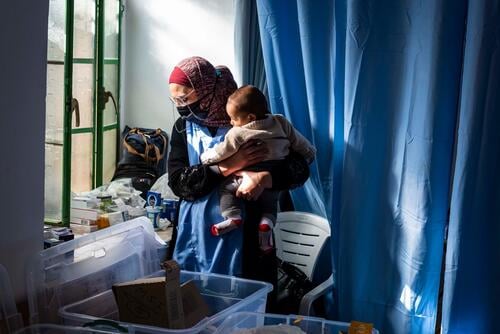Amro, Mohammad, Muawiyah and Mahmoud share an experience: they all underwent amputation after being badly wounded by the Israeli forces. They told their stories to photographer Giles Duley, himself an amputee following injuries sustained in conflict zones.
Amro, Mohammad and Mahmoud are among the 36,000 people who were injured during the Great March of Return protests. These demonstrations were held near the security fence between Gaza and Israel every Friday between 30 March 2018 and December 2019, to commemorate the 70th anniversary of the 1948 exodus, an event known to Palestinians as the “Naqba”. Muawiyah was injured during the 2021 bombing of the Gaza Strip by the Israeli forces. Like 152 fellow Palestinians, they suffered amputations to prevent the risk of infection in their wounds.
Giles Duley invited Amro, Mohammad, Muawiyah and Mahmoud to tell the stories of their lives after amputation, during his visit to Gaza in March 2022.
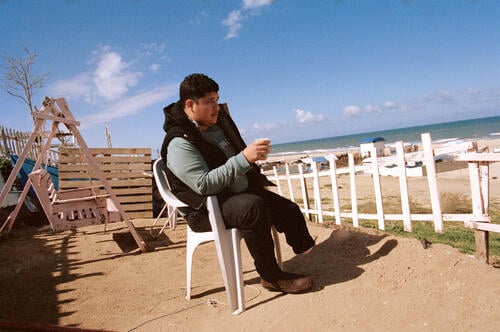
Chapter one: Amro Ayman Alhadad
Amro, 23, was injured by an Israeli army bullet on 14 May 2018, during the Great March of Return.
After receiving emergency treatment in Gaza, Amro was taken to Turkey for more surgery. His leg was amputated. On his return, Amro locked himself in his family's apartment in Gaza City.
“I found escape in drawing, I watched videos online and taught myself to be an artist.” Amro didn't dare to go out for fear of how people would look at his amputated leg. He is also afraid of crowds.
On the sidelines of the photography sessions, Giles proposed to share a moment outdoors. “On my last day in Gaza, I asked Amro if he wanted to join me for coffee on a quiet part of the beach. He agreed and we spent a few hours drinking coffee and talking.
I suggested that he meet Mahmoud [another MSF patient, see chapter four] and join an amputee support group. It is through the experience of others that we find hope. He promised he would and asked me to share his story. ‘Maybe my outings will give someone else hope,’ he told me.
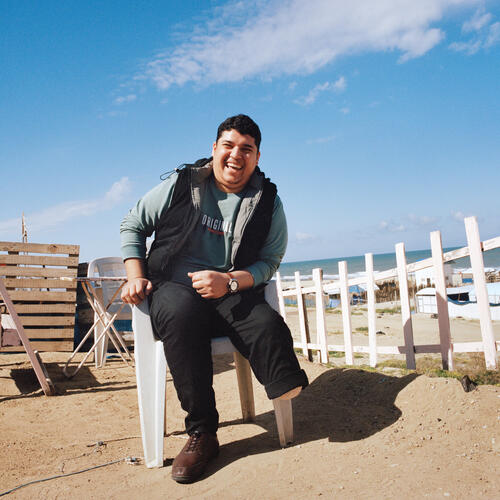
Chapter two: Mohamad Soliman Mohamad Saad
Mohammad Saad was injured on 21 September 2018. He went to the border fence after learning that his 15-year-old son had been injured. Moments after finding him, he was also shot in the leg by the Israeli forces. When he regained consciousness, he was told that he might lose his leg due to a blood clot.
Over the next few years, he underwent 10 operations to stabilise the condition of his leg, but he was unable to walk. He was in pain 24 hours a day and became increasingly frustrated at not being able to work.
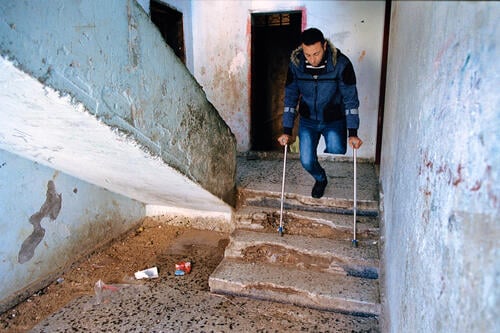
In 2021 he had his first consultation with MSF, who recommended amputation. He quickly accepted, determined to move forward. “Fortunately, I have not felt any stigma. My wife and family have shown me love and encouragement throughout.”
After going through such an ordeal, Mohamad doesn’t hesitate to share his experience, “If doctors advocate amputation, I would recommend doing it. Before I did, I couldn't go outside or play with my children. Now I can do everything. After three years of pain, I can finally get on with my life.”
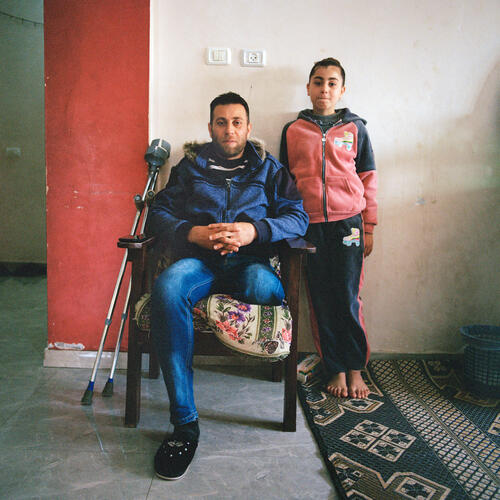
Chapter three: Muawiyah Al-Wahidi
On 12 May 2021, Muawiyah, 42, was opening his barber shop in Gaza City when a rocket hit a car in the street. He was unhurt, but the tailor working across the street ran towards him, shouting that he had been hit in the chest. Halfway to Muawiyah he collapsed, blood pouring from his mouth.
Muawiyah was crouching next to him reciting prayers when the next rocket hit. When he woke up in the hospital, his right leg had been amputated and his left ankle was broken.
In the weeks that followed, he refused to eat and suffered from depression. “I would look at myself and then look at others and say to myself, I don't want to be different.” When he returned home from hospital his depression got worse. “At first I refused the food my wife cooked, it was hard for her. I was angry at her, at my brother, at the kids. It was hard. But fortunately, we got through it.”
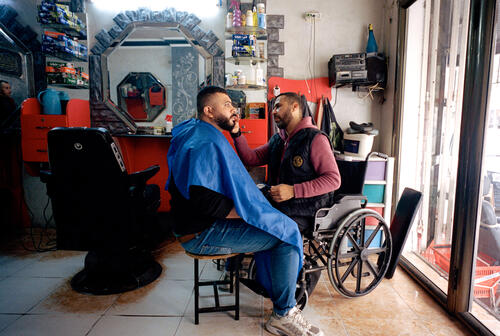
Community support played an important role in his journey. So did the guidance of Marwah, an MSF psychologist, who taught him and his wife Yassmin how to deal with anger and depression.
A few days after meeting Muawiyah at his barber shop, photographer Giles Duley was invited to dine with his family.
As we cooked, Yassmin told me, “At first it was hard for me and the kids. I had to pretend to be strong for everyone.”
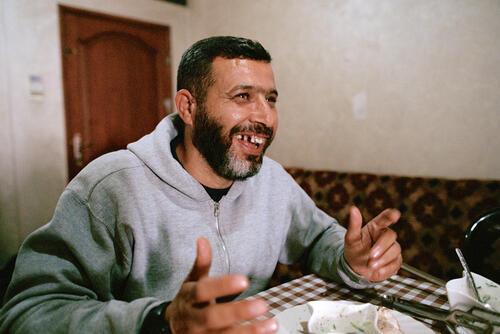
Chapter four: Mahmoud Khaled Ibrahim Khader
Mahmoud, 27, had his leg amputated after he was shot in the thigh in May 2018.
He was initially transferred to a hospital in Jordan where surgeons attempted to save his leg. After 38 days, with no signs of the bone healing, the decision was made to amputate. Further surgery followed, but a prosthesis could not be used because the wound remained infected.
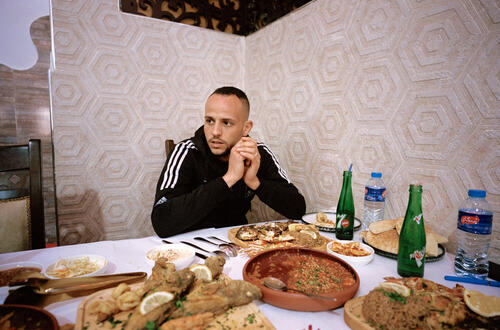
In July 2020, two years after losing his leg, Mahmoud met an MSF medical team, who suggested a new amputation. The team believed that removing an additional five centimetres of bone could reduce the infection and create a more stable stump that would be better suited to a prosthesis. Almost immediately after the surgery, Mahmoud could feel the difference. Soon enough he could wear a prosthesis and was able to return to work.
Nevertheless, he feels subjected to the insistent gaze of passers-by and to prejudice, such as the idea that amputees are more likely to become drug addicts. “My girlfriend's parents refused to let me marry their daughter. They told me they didn't want their daughter to marry a drug addict. That was hard to hear.”
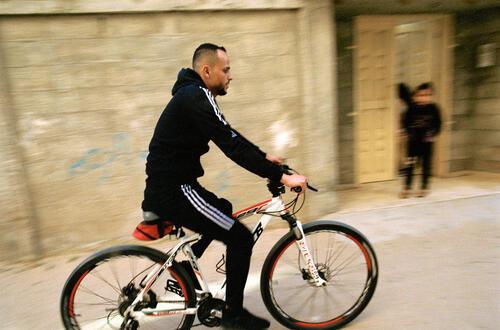
It was a chance encounter with a group of amputee cyclists that helped Mahmoud find peace. He can now both release his energy and spend time talking with people who share a similar experience. “Cycling became my escape, and through this activity people could see that I was athletic and not on drugs.”
A week before meeting Giles, Mahmoud got married. Today, he dreams of starting a family. “But,” he says, “cycling will always be a part of my life. This group is also my family.”




